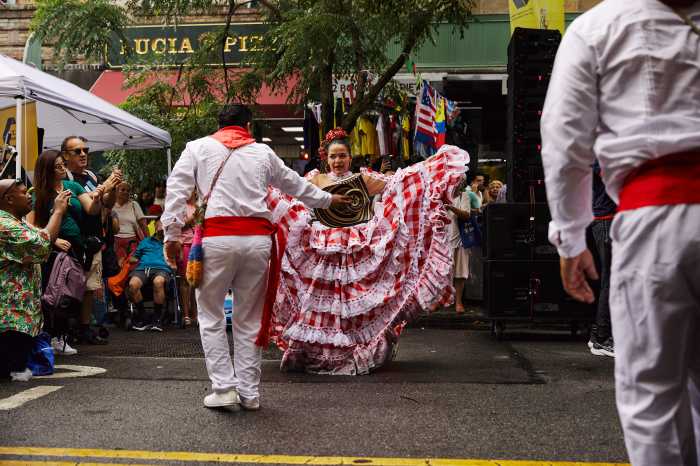By Raphael Sugarman
Jake Ehrenreich admits that the title of his Off-Broadway show, “A Jew Grows in Brooklyn,” might easily include the addendum, “but also blossomed in Queens.”
“My time in Queens was very important in my life,” said Ehrenreich, who lived in Whitestone for several years in his late teens and early 20s. “Queens opened up worlds that I had never seen before in Brooklyn.”
Ehrenreich’s experiences in the borough certainly were diverse — from trying sushi for the first time on Main Street, to performing the Mets’ theme song in Yiddish at Shea Stadium’s Jewish Heritage Day. The Yiddish “Meet the Mets” was translated by his father.
“The Mets were like the Jewish people, always underdogs,” he said. “I never understood why any of my Jewish friends were Yankee fans.”
Though Main Street’s Tekka-Maki rolls seem to have little in common with either America’s national pastime or Judaism’s cultural hodgepodge of a language, the troika speaks volumes about Ehrenreich’s one-man show.
For “A Jew Grows in Brooklyn” is a play about the seemingly contradictory lives of immigrants and the panacea and pressures of being among those yearning to breathe free.
It is about longing to blend in while maintaining your core — or at least not be bullied in the school yard.
Mostly, Ehrenreich’s script is about aching to forget parts of his family’s horrific past, while shifting focus to its temerity, unforgettable characters and simple survival.
A resolute family of immigrants is also the theme of Betty Smith’s 1943 novel, “A Tree Grows in Brooklyn,” upon which the title of Ehrenreich’s play is based.
Smith’s hugely successful novel focuses on an Irish-American family in Williamsburg, Brooklyn, during the first two decades of the 20th century.
Now in its seventh year of playing long runs in New York, as well as touring to at least 25 cities in the United States and Canada, “A Jew Grows in Brooklyn” is purely autobiographical, sharing the story of Ehrenreich’s family of Holocaust survivors from Poland.
“Obviously, the main challenge of being the child of a Holocaust survivor is not having an extended family,” said Ehrenreich. “No grandparents to get that special kind of love from. No aunts, no uncles, no cousins.”
Fitting in
All told, Ehrenreich’s parents, Jonah and Bella, had eight brothers and sisters and many other relatives murdered by the Nazis.
While in his play Ehrenreich by no means ignores this unspeakable tragedy (sharing somber thoughts about its effect on both his immediate family and himself), he perpetually steers the production toward the positive.
“I try to focus on those things you should be grateful for,” he said in an interview following the play.
“We don’t have the choice to determine all of our circumstances, but we do have the choice to determine where our focus is,” he said. “When I look back in my show, I try to focus on the joyful things we shared together.”
Ehrenreich spends much of “A Jew Grows in Brooklyn” reflecting on how he strived to be a regular New York kid despite living in a home with immigrant parents. He also shares memories of the parents’ difficulties in appreciating American culture.
“Two people play and eight people stand and watch,” Ehrenreich’s puzzled father says to his son nicknamed “Yankele” when they watch a baseball game for the first time on the family television.
Luckily the kid who wanted to be the All-American boy was a gifted athlete in high school, playing baseball, basketball and football.
“Every kid had a Spalding and the parks had no grass, they were concrete and metal,” he said during the show. “It was an injury attorney’s dream.”
In addition to his athletic prowess, Ehrenreich is an accomplished musician and actor. He performed on Broadway in “Dancin’,” “They’re Playing Our Song,” and “Barnum.” He also worked with Joseph Papp at the Public Theater’s Shakespeare Festival in the role of Jonah.
In a “Jew Grows in Brooklyn,” he sings, plays both the trumpet and trombone, does a walloping drum solo and even performs a comedy routine in a sequined blazer.
Relearning a grin
Much of this performance material is used to recall the Ehrenreich family’s trips to the Catskill mountains every summer. Ehrenreich shows slides of he and his family, including one image of his father wearing both a bathing suit and black dress socks.
He paints a vivid picture of days at the one of the area’s countless resort hotels, with copious meals and entertainment.
“I would hear my father crying through the locked bathroom door in the fall and winter,” said Ehrenreich, “and in the summer I would see him laughing. It’s where all these people learned to laugh again.”
As several critics have noted, theatergoers don’t have to be Jewish to appreciate this show. No doubt it is particularly poignant for Holocaust survivors and their children.
But it will ring a bell for all audience members in a city of immigrants.
“We have an awareness of each other and an understanding of what our childhoods were like,” said Ehrenreich, referring to children of immigrants, particularly Holocaust survivors.
He said that he often rewrites portions of the show, apt for a work about immigrant families. “Lots of us are still working through things.”
“A Jew Grows in Brooklyn” is playing through Aug. 11 at the Jacqueline Kennedy Onassis Theater, located at 120 W. 46th St. To purchase tickets, call 866-811-4111, or go to www.ajewgrowsinbrooklyn.com.





































